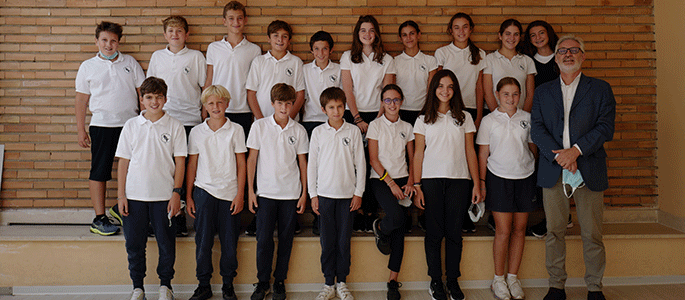
A flexible approach: building a curriculum to meet students’ needs
Linguistic Director Simon Charlesworth has worked at Istituto Santa Giuliana Falconieri in Italy for nine years. He manages the school’s Cambridge and language programmes from pre-school to high school. He believes the flexibility of Cambridge has been key to the programme’s successful roll-out.
'Istituto Santa Giuliana Falconieri has been a Cambridge school since 2015. It has around 650 students – they are mainly Italian, with a small percentage of students from other European countries and the US.
'Over the last 10 years, we’ve developed a strong bilingual side to the school. There’s been a lot of growth and that’s been helped by joining the Cambridge network. It was a very local school, but now we are finding families choosing to come quite a distance.
'Our students benefit from exposure to a second language from an early age – they are more receptive, creative, and more able when it comes to problem solving. We start in pre-school with about 50 per cent of the day in English – an Italian teacher works together with the English teacher.'
Building the curriculum year on year
'The flexibility of the Cambridge programme helps us build a school curriculum that fits our requirements. We do this by introducing one subject at a time or by launching a full programme from day one. We successfully run our Cambridge programme alongside our Italian national curriculum.
'All students are now enrolled in Cambridge Primary and Lower Secondary. We offer English as a Second Language, English, Science, Music, Art & Design and Global Perspectives. Students do between 8 and 10 hours of the Cambridge programme a week. The time builds through the years – we increase the hours of Science and English in the third year of primary.
'The Cambridge programme develops a wide range of skills for students’ future success in each subject and offers a clear pathway, with each level seamlessly building on the previous one. We have found the approach is child centred and offers activities to fit each learning preference.
'We’ve built the programme year by year, so for us it really is considered just one continuous programme – a progression. You can see the same or similar subjects going from one level to the next – so, for example, English as a Second Language is present from Cambridge Primary to Cambridge Advanced, as is Science up to Cambridge IGCSE.
'At the end of Cambridge Lower Secondary, our students do Cambridge Checkpoint Science and Cambridge Checkpoint English as a Second Language tests. We also run Progression Tests each year. Students can see their gradual progression and that their learning will be supported. They enjoy regular feedback on how they are doing in the programme and receiving clear, achievable goals. That gives us good feedback on how they are doing and how we have to diversify teaching and learning for each student.
'Parents can see objectives from the first day of school – where we are going and what we are going to be achieving in each cycle of the school year. This year, we have a 95 per cent re-enrolment rate from Cambridge Primary into Lower Secondary. It’s great that our young students are staying at the school and progressing from one stage to the next.’
Developing thinking and practical skills
'For English and science, we switched to the revised Cambridge Primary and Lower Secondary curricula from September 2021. The stronger focus on developing thinking and practical skills is a welcome change.
'We will be introducing Cambridge Maths into our Lower Secondary programme next year in 2022. The changes made to the curriculum through enquiry-led active learning have contributed to our decision to include it. We find that this type of approach to Maths is missing in the Italian national curriculum. Thinking and Working Mathematically involves students making decisions – this will help them approach questions and problems during assessment activities.'.
Tips for introducing Cambridge
'If you are planning to introduce Cambridge programmes, I would advise getting all of your teachers involved – not just the English teachers. It is well worth spending some time talking to teachers to get information from them on how they can see the programme developing in your school. Every school is different and the great thing about the Cambridge programme is that it is very flexible.
'If you spend enough time getting your programme right from the start, you’ll find you can then just tweak it here and there on an annual basis.'